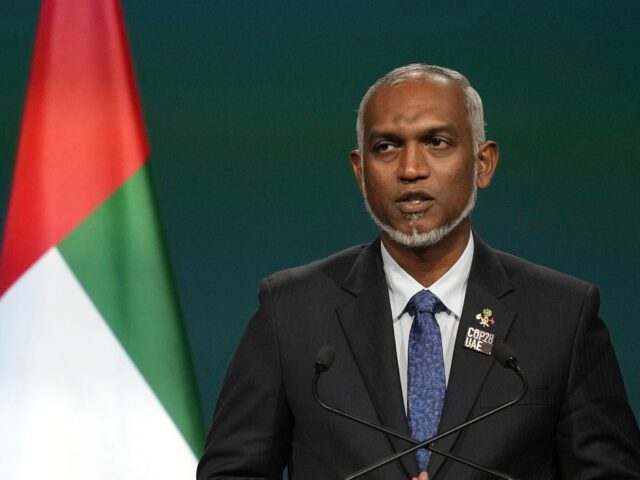The South Asian island state of the Maldives announced Sunday it would ban individuals with Israeli passports from entering the country as a form of protest against Israel’s ongoing self-defense operations against the jihadist terror group Hamas in Gaza.
The change will require an overhaul of several Maldivian laws, the office of President Mohamed Muizzu explained, which the executive would spearhead to ensure Israelis could not enter the country.
The move is the latest in a growing list of unfriendly gestures by Muslim states towards Israel, intended to oppose operations to neutralize Hamas following its invasion of Israeli territory. On October 7, thousands of Hamas terrorists invaded the country and engaged in a host of atrocities including the massacre of entire families, documented instances of torture and gang rape, and the mutilation and desecration of corpses, in some cases filmed for entertainment.
Hamas terrorists killed an estimated 1,200 people on that day and took 250 hostage, of which about 130 are believed to remain somewhere, dead or alive, in Gaza.
The Islamic world has rallied around Hamas and the “Palestinian cause” following Israel’s formal declaration of war against Hamas on October 8 and the launch of the Israel Defense Forces (IDF) self-defense operation in Gaza. While most Muslim states do not maintain diplomatic ties with Israel, some escalated their anti-Israel rhetoric. In at least one case, that of pro-Hamas Turkey, the October 7 attack resulted in Islamist President Recep Tayyip Erdogan announcing a trade embargo on Israel in May.
The office of Maldivian President Muizzu announced on Sunday that the president “has resolved to impose a ban on Israeli passports.”
“The Cabinet decision includes amending necessary laws to prevent Israeli passport holders from entering the Maldives and establishing a Cabinet subcommittee to oversee these efforts,” the presidential office statement read.
“Additionally, in the case of Palestine and Israel, the President decided to appoint a special envoy to assess Palestinian needs,” the message continued, adding that this would include fundraising efforts of the U.N. Relief and Works Agency for Palestine Refugees (UNRWA), a Hamas-affiliated organization.
The government of the Maldives is formally Islamist and requires its officials to be Sunni Muslims. It previously banned Israelis from entering during the 1990s and early 2010s, rescinding the ban in 2010. Muizzu has vocally opposed Israel’s attempts to prevent another Hamas siege through self-defense operations, issuing a statement on the day of the attack condemning Israel for its alleged “illegal occupation of Palestine.”
“Israel should recognize Palestine as an independent state with East Jerusalem as its capital within 1967 borders and allow the immediate return of refugees,” Muizzu demanded on October 7.
The Qatari outlet Al Jazeera noted on Sunday that a host of Muslim countries also ban Israeli passport holders from entering: Algeria, Bangladesh, Brunei, Iran, Iraq, Kuwait, Lebanon, Libya, Pakistan, Saudi Arabia, Syria, and Yemen.
The Israeli government responded to the announcement on Sunday by warning its citizens already in the Maldives to leave if possible.
“For Israeli citizens already in the country, it is recommended to consider leaving, because if they find themselves in distress for any reason, it will be difficult for us to assist,” a Foreign Ministry statement read. The Israeli government had already discouraged travel to the Maldives in December in response to growing pro-Hamas sentiment in the country after October 7.
Israel’s embassy in neighboring India responded by recommending Israelis visit that country instead, posting photos of “amazing Indian beaches” as an alternative.
“Since the Maldives is no longer welcoming Israelis, here are some beautiful and amazing Indian beaches where Israeli tourists are warmly welcomed and treated with utmost hospitality,” the embassy suggested on Monday.
Indian publications noted that one of the photos shared was of Lakshadweep, an Indian beach destination the government of Prime Minister Narendra Modi has aggressively championed as an alternative to the Maldives. Relations between India and the Maldives – for decades extremely friendly as a result of their proximity to each other – soured dramatically in January after Modi encouraged wealthy Indians not to spend money in the Maldives.
“If we celebrate the festivities of marriages on Indian soil, amid the people of India, the country’s money will remain in the country,” Modi said in December, later sharing a video promoting tourism in Lakshadweep.
In response to Modi’s tourism campaign, three Maldivian ministers posted angry messages disparaging the Indian prime minister on social media, referring to him as a “clown,” a “terrorist,” and a “puppet of Israel.” Indian travel companies responding by suspending bookings to the Maldives.
“We decided to take this step because any self-respecting nation should do this,” the head of the Indian travel company EaseMyTrip, Prashant Pitti, said following the suspension of Maldivian bookings. “The statements which we heard from the representatives of the Maldives government were extremely derogatory to the country.”
Contrary to the Maldives, Modi’s government enthusiastically condemned the October 7 atrocities and has abstained from advocating against the destruction of Hamas.
“It is not about supporting Israel or Palestine but condemning the act of terror. It is not a war between two countries,” BJP spokesman RP Singh said in the immediate aftermath of the attack, calling Hamas “worse than ISIS” and insisting that the terrorists “started it.”
Modi himself issued a statement following the attack asserting, “people of India stand firmly with Israel in this difficult hour.”

COMMENTS
Please let us know if you're having issues with commenting.